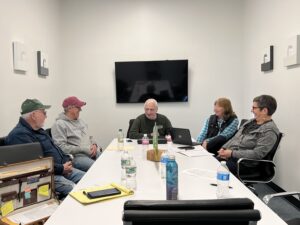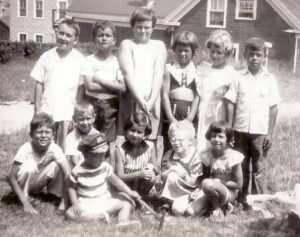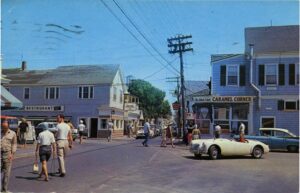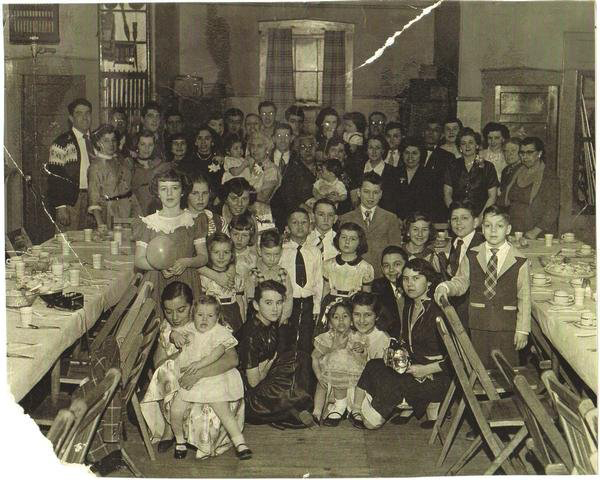PROVINCETOWN — Dogs named Riches and Poverty. Ice houses. The time the harbor almost froze over. Kids sliding at night in midwinter. Dune skiing with cheap skis. Fires on the beach made from car tires. Cooking cockle clams pried from sewer grates in dirty paint cans. Swimming after a rainstorm alongside floating sewage. Diving for coins off the pier.

For two hours each Tuesday morning, Conference Room A at the Provincetown Commons becomes a View-Master clicking through these visions of childhood and adolescence in the old Provincetown. A company of locals who call themselves Our Writers Group have met weekly here for the last two years. They have witnessed the plastic surgeries and cast changes of this town over more than 60 years.
Like the first snow of the season, the echo of their interwoven histories, incubated in the warmth and fluorescent light of their meeting place, muffles the outside world and slows it down. A couple of people have rotated out of the group, but the core members remain the same: Peter Cook, Mel Joseph, Avis Johnson, and Anika Costa. Phoebe Otis, a former cabaret singer who has self-published two books, is the unofficial archivist. Russell Sanderson, who worked in the Provincetown court system and played guitar in a local band, is the newest member.
“I might walk on the new sidewalk, but that’s not the one I see,” says Joseph, a software engineer who now lives in West Barnstable. “We lived the same life in different families.”

Actually, Cook and Johnson are cousins, and for a few years when they were children they lived in the same house and liked to watch cartoons together in the evenings. All the group members — except Otis, who arrived in town in 1975 — were born here, several in their family homes attended by the town doctor, Daniel Hiebert. They went to the Veterans Memorial Elementary School, where Sanderson’s grandmother, “Aunt Fanny,” served them lunch. They married young, and the diaspora of their children, grandchildren, and great-grandchildren carry the blood of the old Portuguese fishing families that once fed and populated Provincetown.
Cook, the group’s founder and facilitator, is a retired fisherman and auto mechanic with a filmmaker’s eye. His grandparents arrived in Provincetown from the Azores, and he was born in 1945 in his uncle’s house at the corner of Court and Cudworth streets. (He was the subject of a profile by Oliver Egger in the Independent last June.)
Cook’s family stories include one about a friend of his grandfather sending for a 16-year-old relative in the Azores after the grandfather’s first wife died. She was meant to care for the young children in a Portuguese version of The Sound of Music story. One thing led to another, and they got married and had several more children together, from whom Peter is descended.
Cook told a dramatic story of his experiences on a scalloping vessel at this year’s Portuguese Festival, and the writers group held a two-hour public reading of their work at the Provincetown Theater on Nov. 20, with Dennis Minsky serving as emcee.
Cook starts each meeting of the group by handing out bottles of water and going through notes on a yellow legal pad. He reflects on the last meeting and asks the group for input on how they think things are going. Then they chat, laugh, and share. They take pride in telling it straight.

Failed relationships, substance use disorder, grocery shopping, and “copping a feel” are all acceptable material for conversation. The traumas of the past are acknowledged but not sensationalized, and there is something indelibly touching about how that shows up in their relationships with each other. In writing and remembering together, they collectively resist the erosion of the people they used to be and the places that shaped them.
“It’s nice to face ourselves,” says Johnson. She says she comes from a family of song and dance people and has always thought of herself as a lyricist, but the act of recording her experiences in prose helps her to remember the past in a different way than songwriting.
Costa, an active member of the Provincetown Public Landscape Committee and Historical Commission, recently urged the group to start using writing prompts again in addition to their independent work. At the last two meetings, members have talked about their reflections on “ego” and “writing.”
For “ego,” Costa focused on Freud’s trinity — id, ego, and superego — and how it relates to the tension she observes in town between the haves and the have-nots. Sanderson talked about his first touchdown as a high school football player, captured in clips from the old Provincetown Advocate. For “writing,” Cook and Joseph faced the gods of coincidence and authenticity. Johnson left the group with this image: the lemons are in the dump, decomposing next to the cursive script she learned before she left school at 14.
Dec. 4 marked two years since Cook started the group and sent Joseph a message inviting him to meet and share his stories. It was soon after Joseph’s wife died, and he began driving an hour down Cape from West Barnstable for the Tuesday morning meetings. In warmer weather, he bikes the 50-odd miles each way. The group has been the greatest therapy, says Joseph.

“It’s social time to get it all out — the good, the bad, the ugly,” says Cook. “We buoy each other up. We keep each other from drifting off into the sea of despair.”
Time has eaten the Portuguese surnames off the mailboxes. It’s disbanded the bicycle gangs of children laying claim to neighborhood kingdoms in the East and West End. “Gurry” is not smelled but Googled. But Our Writers Group is here to tell the stories.
At home, on their word processors and stacked on desks, they each have hundreds of pages of memories. Cook wants to publish them one day, and he hopes the group will go on after he is gone.
“Not all of us are writers, but we’re all storytellers,” he says. “If we don’t tell these stories, who will?”



